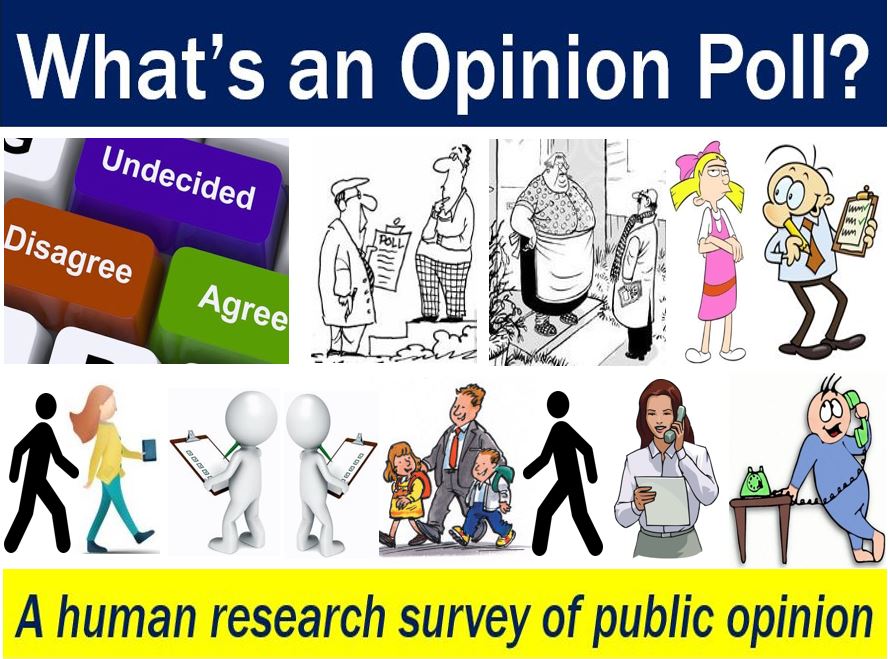An Opinion Poll is a survey in which canvassers ask a representative sample of people the same questions. The opinion poll aims to find out what people think about a theme or issue. It is a market research technique in which polling companies ask people about their opinions.
Organizations use opinion polls during election campaigns to determine which party is most likely to win. In fact, there are political polls even when there is no election campaign.
We also call an opinion poll a Gallup poll. We name Gallup polls after George Gallup (1901-1984), an American statistician who was a pioneer in sampling techniques.
Mr. Gallup and Claude E. Robinson founded the advertising research company Gallup and Robinson Inc. in 1948. It later became the Gallup Organization.
Opinion poll – a scientific survey
What makes an opinion poll scientific? There are two features to ‘scientific’ opinion polls:
- A research company chooses the respondents.
- The company has gathered sufficient information about the respondents. In other words, the data in the results match the profile of the survey group.
For example, let’s suppose that thirty percent of the target population is over 55. The polling company must, therefore, ensure that the sample population has the same proportion of people aged 55+.

Opinion poll accuracy
Opinion polls never claim to be one-hundred percent accurate. Put simply; none of them can perfectly reflect opinions in the whole population.
Imagine that nationally, people’s opinions regarding the death penalty are split fifty-fifty. In other words, 50% are for, and 50% are against the death penalty.
According to statistical theory, in a random poll of one-thousand individuals, the survey will be 100% accurate 19 times out of 20. Therefore, the opinion poll is accurate to within three percent. In other words, it has a 3% margin of error.
However, to be accurate within three percent, you must have a 100% response rate. That is, all the people in the randomly-selected population responded.
If fewer than 100% of people in a survey respond, then its accuracy will be inferior.
With a sample of 2,000 respondents, the poll will have a 2% margin of error – with a 19 times out of 20 accuracy. Also, only if 100% of the people in the sample population respond.
Advancements in digital technology and social media analytics have significantly influenced the methodologies and reach of opinion polls, offering new insights into public opinion trends
Over the past few years, opinion polls have become worse at predicting election or referendum results.
Most polls predicted that Britons would choose to remain in the European Union. However, in a 2016 referendum, 52% of British voters chose Brexit. Brexit stands for BRitain EXITing the European Union.
Most opinion polls also got the 2016 American presidential elections wrong. They predicted that Hillary Clinton would win. However, Donald Trump won.
“Opinion poll” vocabulary and concepts
There are many compound nouns in the English language containing the words “opinion poll.” A compound noun is a term comprising two or more words. Let’s take a look at some of them, their meanings, and how we can use them in a sentence:
-
Opinion Poll Data
The collected information and results from an opinion poll.
Example: “The opinion poll data revealed a surprising shift in public sentiment towards environmental policies.”
-
Opinion Poll Analysis
The process of examining and interpreting the results of an opinion poll.
Example: “After thorough opinion poll analysis, the political strategist adjusted the campaign’s messaging.”
-
Opinion Poll Survey
Another term for an opinion poll, emphasizing its nature as a survey.
Example: “The latest opinion poll survey indicates a growing support for renewable energy sources among the population.”
-
Opinion Poll Result
The outcome or findings of an opinion poll.
Example: “The opinion poll result was unexpected, showing a significant lead for the outsider candidate.”
-
Opinion Poll Methodology
The specific techniques and processes used in conducting an opinion poll.
Example: “Critics questioned the opinion poll methodology, pointing out potential biases in sample selection.”
-
Opinion Poll Sample
The group of individuals selected to participate in an opinion poll.
Example: “The opinion poll sample was carefully chosen to represent a diverse cross-section of society.”
-
Opinion Poll Trend
The general direction or pattern in public opinion as indicated by multiple polls over time.
Example: “The opinion poll trend over the last year shows increasing concern about climate change among voters.”
Derivatives of “poll”
There are many derivatives of the English root word “poll.” Here are some of them, their meanings, and their usage in a sentence:
-
Poll (Noun)
A process of voting or surveying a group of people.
Example: “The latest poll shows an increase in support for environmental initiatives.”
-
Poll (Verb)
To conduct a survey or vote among a group of people.
Example: “They decided to poll the members to determine the next course of action.”
-
Pollster (Noun)
A person who conducts or analyzes opinion polls.
Example: “The pollster predicted a close race based on recent survey data.”
-
Polling (Verb – Present Participle)
The act of conducting a survey or vote.
Example: “Polling will continue until 8 PM tonight.”
-
Polled (Verb – Past Tense/Past Participle)
Surveyed or questioned in a poll.
Example: “The company polled 1,000 consumers to understand their buying habits.”
-
Poll-Taker (Noun)
Another term for a pollster or someone who conducts polls.
Example: “As a poll-taker, she spent her day surveying people’s opinions on various topics.”
